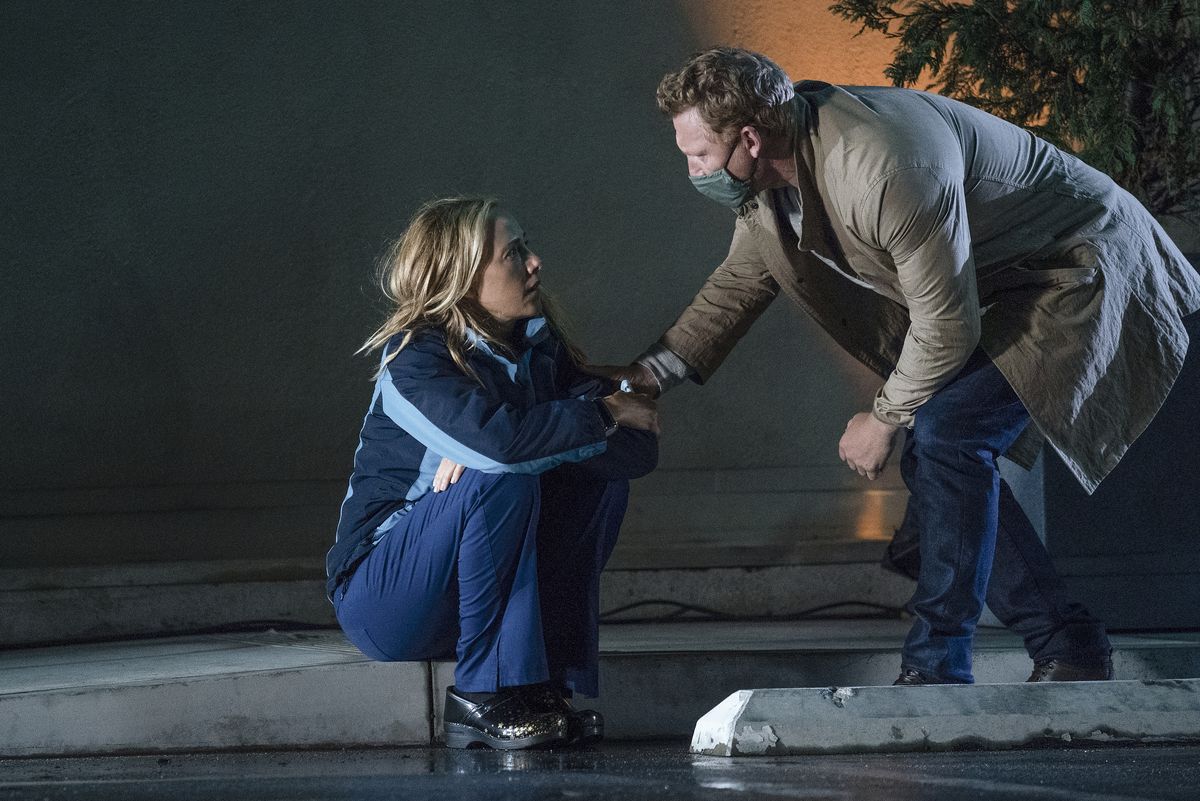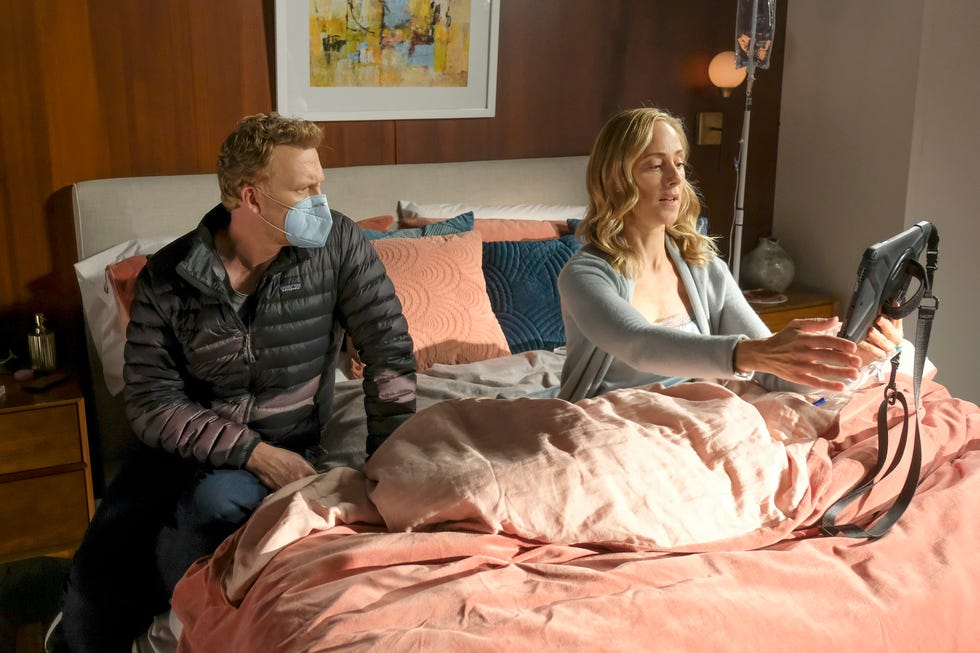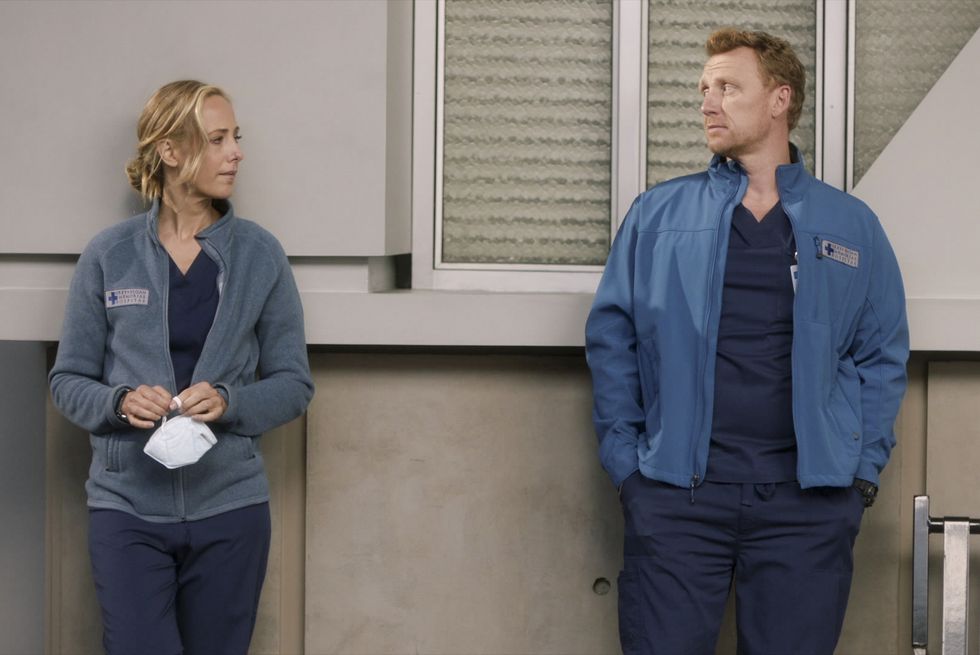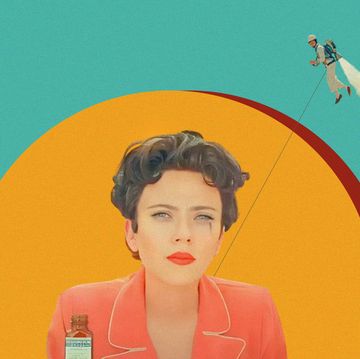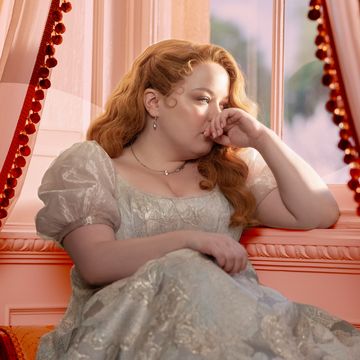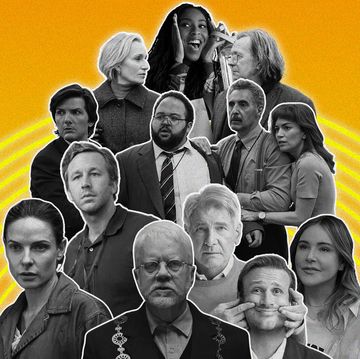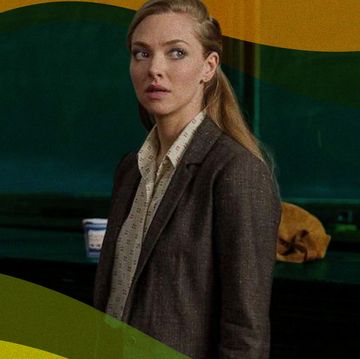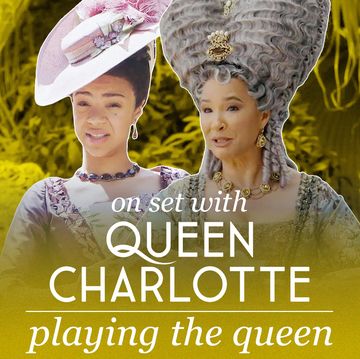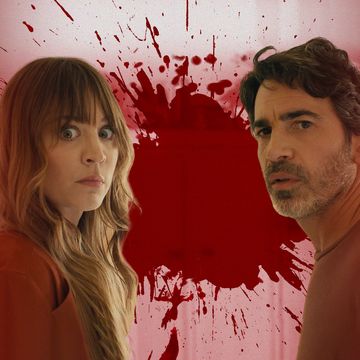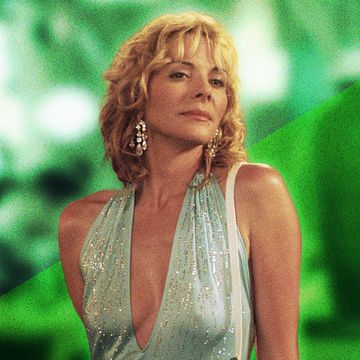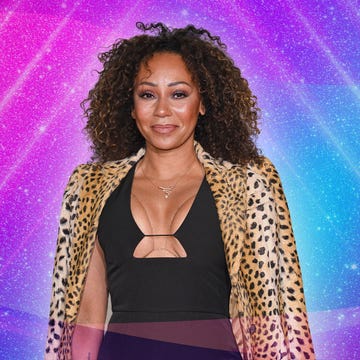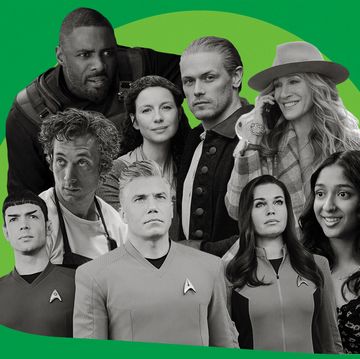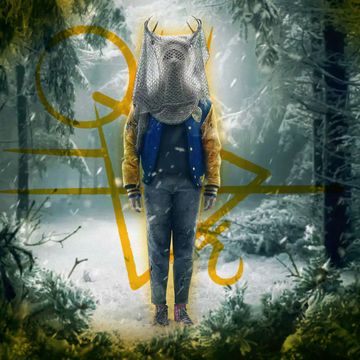Well, that was a rollercoaster of emotions. The decades-long friendship between Teddy Altman and Owen Hunt came to a subconscious reckoning in last night’s Grey’s Anatomy episode, “In My Life.” Losing DeLuca on the operating table clearly has sent Teddy into a tailspin. After DeLuca’s funeral, Teddy, bereft with grief, has to be carried home by Owen. At their house, she’s wide-eyed but clearly not conscious, and from there the episode takes us into a reverie of sorts where all Teddy’s demons from the past come out to play.
But we might say that this was all a long time coming. Teddy has jumped into one flaming house after another ever since 9/11 and the loss of her “one true love,” Allison, in the terrorist attack on the World Trade Center. (Though, it may go back even further with the sudden death of her father and then her mother not long after.) Whatever it is, it’s clear that Teddy has had a lot of trauma. And so has Owen. And when you put two traumatized people together, things can get messy.
Viewers probably noticed that “In My Life” was stylistically and tonally very different from most Grey’s episodes — lighting and atmosphere were dreamlike; snow fell indoors; and sequences took us from an ocean-side hotel suite to Germany to New York City and back to Grey Sloan Memorial Hospital with empty operating rooms. Coincidentally, the episode was helmed by Kevin McKidd (Owen) himself. Over the years, McKidd has directed 30 episodes of Grey’s Anatomy and couldn’t believe his luck when he was assigned his 31st.
“We were so lucky to have Kevin [direct] this one,” Raver tells Shondaland, “because it really took someone from the inside who understands the mechanics… and the characters so well [in order to make] such a visually incredible episode. [Showrunner] Krista Vernoff has done so brilliantly with the quintessential show we’ve been lucky enough to have for 17 seasons but infusing it with these new journeys — the beach and the dream work, bringing in old cast members — This season has sort of been its own show where that dreamlike, cathartic feeling touches on what we’ve all been going through this year with the pandemic.”
We talk with the two Grey’s veterans about Teddy and Owen’s rollercoaster relationship and what might be down the line for them as a couple, the trauma they both carry with them, the challenges and triumphs that come with directing an episode that you’re also acting in, and the massive amounts of respect they hold for each other as artists.
VALENTINA VALENTINI: This whole episode is quite a departure from the usual Grey’s narrative format. How did that come about?
KEVIN McKIDD: I think the writers got to a point where they needed to depict the inner psychology of Teddy’s character. I felt really lucky to be the one directing that episode, but, honestly, I felt scared too because it is a real departure — it’s almost like we created a whole new show, like a pilot episode, because it really isn’t an episode of the Grey’s Anatomy that we’re known for.
KIM RAVER: Kevin was able to take some really amazing risks in that hospital, visually speaking. He just did a beautiful job.
KM: Why thank you, Kim.
KR: It really was so incredible; I don’t know a lot of people who could juggle what he did with also having so many scenes. It wasn’t just a line here or there; he had massive scenes with Caterina Scorsone [Amelia Shepherd] and massive scenes with me. I think actually that really helped because — and I can’t speak for Caterina — but, for Kevin and me, there was such ease while being across from each other, like at the dinner scene, the wedding scene, or the bedroom scene. I don’t know that that would have been there with a guest director. It all goes back to what Shonda and Krista have created and fostered: the company, almost like those old theater companies. And it generates and allows for beautiful work to come out of that.
VV: Teddy and Owen are such an iconic couple, and they’ve been going through such a rough time. And it’s just so perfect that you, Kevin, got to direct this episode of them colliding in such a unique way.
KM: You know, it’s so funny because I got to direct the episode where we see them in Germany together, so it felt right that I got to go back there in this dreamscape. Subtle things like that, and a familiarity with the world that we’ve created over 17 years. I think it would be harder for somebody who’s from the outside to understand the layers and layers of history between these characters. And, while it was a lot of heavy lifting for me to be in the episode so much as an actor and also to direct, I want to speak to how Kim showed up for this episode. She is in almost every single frame of this episode, and she just killed it — she brought such truth and professionalism and patience. It’s exhausting to be in every single scene, but she is a superstar, so I think we were very lucky on all fronts.
VV: Let’s bring it back to you, Kim. What does Teddy’s journey overall, but also specifically in this episode, say about how we talk about complex women on TV?
KR: We are multilayered, multifaceted people. While we endure a lot, it is beautiful and interesting to show this type of grief. Through the darkness, Teddy is able to find the light — though throughout the episode we don’t know if she’s coming back. Keeping that mystery was a strong note from Krista, which also speaks to the journey of women. That’s the gift of being part of Shondaland, that I get to actually embody someone with that much complexity. I think about starting out in my career, I’d get these slivers of women that have to be stereotypical through the male gaze. But part of Shonda and Krista’s vision is giving life to multilayered people — Teddy’s a mother, a badass surgeon, she was in the war in Iraq, and now she’s battling Covid-19. She’s also trying to figure out the core base of how to self-love, how to be intimate, but, because of her past and because of her pain, that’s not accessible to her. Right there, we’re telling the story from the female gaze, showing a flawed female character who’s not overly sexualized or in service of the male storyline; it’s just such a gift to play that.
VV: It’s surely difficult for Teddy to revisit her past — the loss of her loved ones and, more recently, how much she hurt Owen by cheating on him with Koracick — but this episode was almost a bit satisfying in a way. We get a lot of answers, and holes got filled. Do you agree at all?
KR: Look, I know the fans are really upset, and I’m really upset at Teddy, but I think that this is quintessential Shonda and Krista. Like I was saying: We’re human, we’re flawed. And I love getting to show how we navigate through our imperfections. And, in a way, we show redemption too. Not that it’s an excuse for what Teddy did, but it’s an explanation, and I think it’s a really relatable explanation, especially with what we’ve all gone through in this last year in terms of how Teddy has had some extreme loss in her lifetime. Normally, she’s gone into numbing it out by caregiving others, but she finally hit rock bottom.
VV: That line Amelia says about PTSD — that traumatized people lie to others and to themselves, but it doesn’t mean that everything is a lie — it’s such a poignant moment.
KR: I love that about this episode. Teddy’s PTSD doesn’t present like other people’s PTSD, and just because her PTSD is different from Owen’s, Amelia has those amazing, enlightening moments of saying, “Who are you to say that the way she is grieving is better than the way you did? Or that yours is okay, and hers is not?” It’s an important moment because it’s illuminating the fact that we all grieve differently, we all present differently. The most important thing is can we forgive, and how do we move forward into a healthier space?
VV: Teddy clearly still has some issues surrounding vulnerability and commitment, though.
KR: I think intimacy for her is excruciatingly painful because it brings up her loss and the gravitas of losing both parents, losing the love of her life, losing Henry, played by the amazing Scott Foley. Her only way to survive and stay on two feet was by moving forward and caregiving others. Now, that’s not to say that she didn’t have feelings and deep love for all of those people, but I think it was also a way out and a way to survive and stay functioning.
VV: This reverie showed that all of Owen’s exes are in their marriage. Teddy says, “You keep looking past me.” Was this Teddy signaling that Owen is to take some of the responsibility for their relationship’s demise as well?
KM: There’s all that weird imagery that comes up in dreams that points to a deeper psychological thing going on, something more unconscious, and that was what I wanted to achieve as the director and the way these dreamscapes were written. It gives you a clue towards what’s actually going on under the surface, psychologically, with the character. I don’t think it’s as clear-cut as a right or wrong answer — who’s at fault or to blame, who’s the good guy or the bad guy. That is the point of this episode: It’s very ambiguous. We wanted to touch on the deep, psychological, subconscious things that have been nudging Teddy and her decision-making over years and years; it’s all from pain and trauma.
But, sure, it’s an interesting question whether Owen does carry the relationships with him and whether Teddy’s fears are real or not. That’s still an open question; it’s something that we’ll explore in the rest of the season. But I don’t think it’s simple enough to say that it’s his fault too, because, I mean, listen — I feel like Owen gets blamed a lot of the time anyway, but I do think it’s too simplistic in adult relationships to play the blame game.
KR: What’s interesting, if you want to take the dream point of view, that it’s said that we are all the characters in our dream. So it could also be Teddy saying, “You’ve got to wake up because this is not working. You are not feeling seen.” At the end of the day, Teddy is the one that cheated. She could have been mature enough and said, “This is not working. Let’s sit down and talk about it.” But the point is that she doesn’t have those tools. That’s what I think will be interesting for the audience because the blame and the hurt is still there, but then what do you do with that? How do you move forward and out of it?
The big question we’ve all asked ourselves during this pandemic is do we choose to become better people and how do we do that? The root of this episode, which I hope people take away from it, is that we need to get our s--t together and lead a better life. Some people are able to ask that question, and some are in such a deep PTSD that they can’t actually even ask that question, never mind answer it, so they are drinking themselves to death or sexing themselves with other partners or numbing themselves to the point of not living. That is where Teddy is at this point. And she needs to take the responsibility for her behavior. She cheated on Owen in a really horrific way. And this episode is not the excuse but the explanation.
VV: So, without giving anything away, can you say anything about the future of their relationship?
KR: It’s going to be so interesting to see where that goes, right? It’s exciting because now we can springboard into a whole new place; maybe we both can take ownership of our not-so-good behavior and find out are we even compatible? Can we actually love one another in a healthy, intimate way? Won’t that be fun if it’s them, for the first time, wooing each other? I think that that opens the door for such a beautiful way forward. And if the audience can forgive, it’s going to be a fun journey ahead.
KM: You know that beautiful last scene of the episode, where Teddy’s holding her baby? I love that moment. Teddy and Owen have been operating from this unconscious place of trauma probably since Iraq, and it’s almost like this whole episode is not so much a dream, but it’s about Teddy’s inner soul, if you will, going through this crucible of rebirthing herself. That sounds a bit pretentious, but, by the end of this episode, we wanted to make sure she looked like she’d been through a war, like she’d been shipwrecked and washed up on the beach and being awoken finally. It’s like that famous sequence in The Shawshank Redemption where Tim Robbins’ character has to crawl through the sewer pipes to escape, and he gets out and looks up at the sky, and all the rain comes down on him. This is our equivalent for Teddy in that she’s birthing herself into something else; that instead of living making unconscious decisions, she’s moving into a place of being intentional and conscious.
Valentina Valentini is a London-based entertainment, travel, and food writer and also a Senior Contributor for Shondaland. Elsewhere she has written for Vanity Fair, Vulture, Variety, Thrillist, Heated, and The Washington Post. Her personal essays can be read in the Los Angeles Times, Longreads, and her tangents and general complaints can be seen on Twitter at @ByValentinaV.
Get Shondaland directly in your inbox: SUBSCRIBE TODAY
